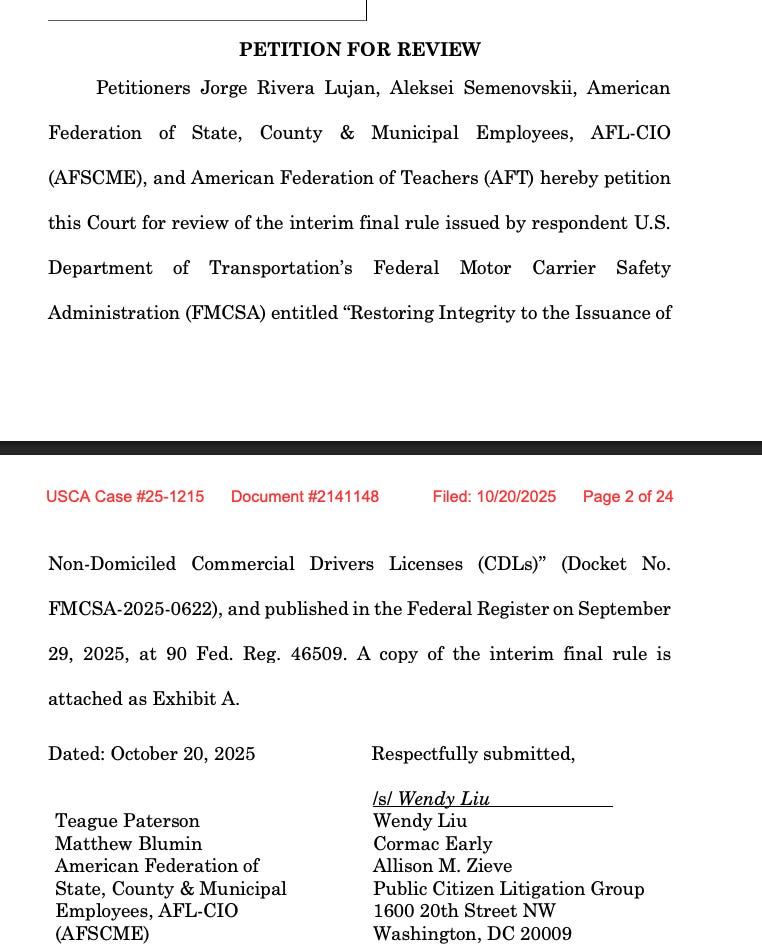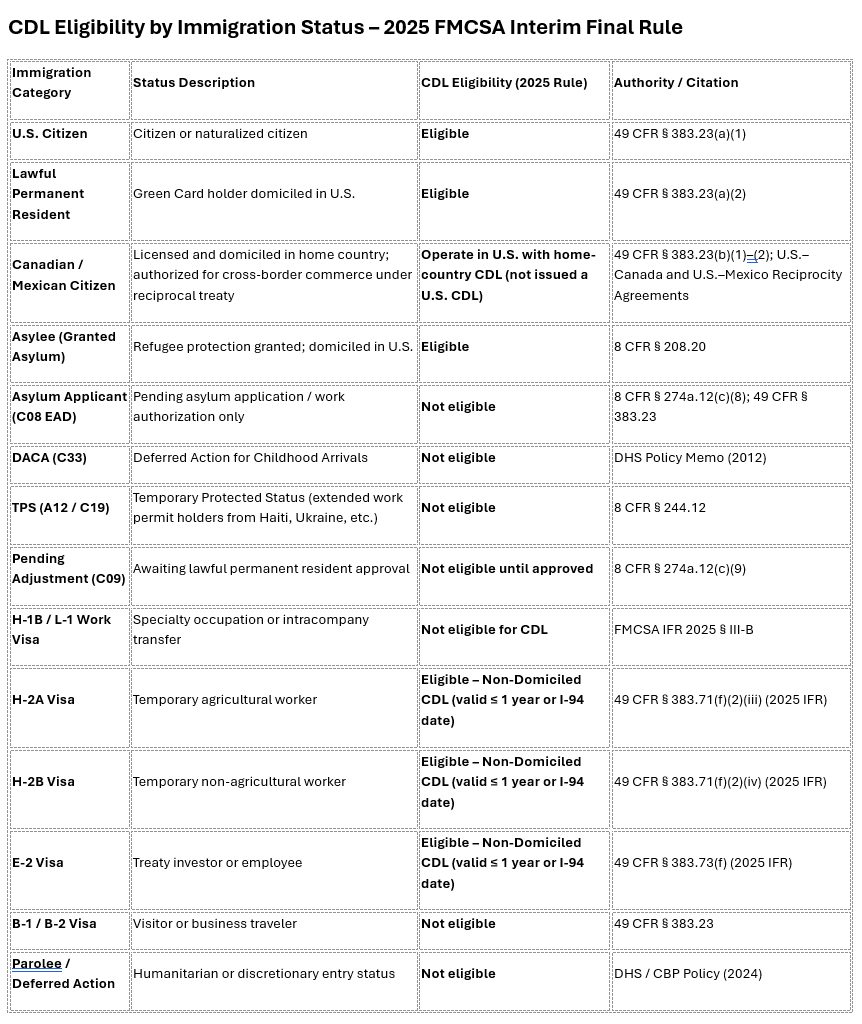Unexpected Challenge to DOT's Immigrant CDL Rule
Why Are Teacher Unions Leading the Fight?
A peculiar legal challenge has emerged in the D.C. Circuit that’s raising eyebrows in transportation law circles. On October 20, 2025, workers and unions filed a petition challenging the Department of Transportation’s controversial rule restricting commercial driver’s licenses for certain immigrants, but the lead challengers aren’t the Teamsters or traditional trucking unions. Instead, it’s the American Federation of Teachers (AFT) and the American Federation of State, County & Municipal Employees (AFSCME) spearheading the fight.
The Rule Under Challenge
The DOT’s interim final rule, titled “Restoring Integrity to the Issuance of Non-Domiciled Commercial Drivers Licenses,” was published and took effect on September 29, 2025. The rule dramatically restricts who can obtain nondomiciled CDLs, licenses issued to individuals who don’t reside within a state’s borders.
Under the new regulation, only immigrants with H-2A, H-2B, or E-2 visas (along with valid passports and arrival/departure records) may obtain these licenses. This excludes:
Asylum-seekers
Refugees
DACA (Deferred Action for Childhood Arrivals) recipients
Despite these groups having employment authorization documents that previously made them eligible for CDLs, they’re now shut out. The challengers estimate nearly 200,000 people could lose access to commercial licenses under this rule.
The Individual Plaintiffs
The lawsuit includes two individual drivers whose situations illustrate the rule’s immediate impact:
Jorge Rivera Lujan is a DACA recipient who has worked as a truck driver for 11 years and owns a trucking company. He has lived in the United States since he was 2 years old. Under the new rule, he was unable to renew his CDL on September 30, 2025, which could potentially force him out of the business he built.
Aleksei Semenovskii is a Russian asylum-seeker whose employment authorization previously allowed him to work as a commercial driver but is now excluded under the new restrictions.
Why Teacher Unions?
The involvement of AFT and AFSCME is indeed unusual for a trucking regulation case. While the exact strategic reasoning isn’t fully detailed in available documents, the most logical explanation is school bus drivers.
Many school bus drivers are represented by these unions, particularly AFSCME, which represents municipal and county employees, including those in school transportation departments.
The AFT’s involvement makes sense as school bus drivers directly impact the union’s core constituency, teachers and students who rely on safe, reliable school transportation.
The Procedural Oddity
As noted, there’s remarkably little in the PACER system about this case despite filings being due in November. This scarcity of documentation is unusual for such a significant regulatory challenge and makes tracking the case’s progress more difficult. The case is filed as Jorge Rivera Lujan et al. v. FMCSA, case number 25-1215, in the U.S. Court of Appeals for the D.C. Circuit.
Broader Regulatory Context
Thanks to insights from Tyler Biddle, an attorney at Childress Law, this challenge fits into a larger pattern of immigration-related transportation enforcement changes. Notably, English language proficiency (ELP) requirements have their own complicated history:
In 2015, ELP enforcement was suspended due to concerns about subjective or discriminatory application
Earlier in 2025, enforcement resumed with drivers now required to demonstrate English proficiency
Legal observers anticipated challenges to both the nondomiciled CDL restrictions and the ELP requirements. What wasn’t anticipated was a teachers union taking the lead role.
The Legal Arguments
The challengers, represented by Public Citizen Litigation Group, plan to argue that:
The rule is illegal
The DOT violated fair rulemaking practices by implementing it as an interim final rule without proper notice and comment procedures
Attorney Wendy Liu stated: “This unlawful rule seems intended to put people authorized to work in the United States out of work, solely because of the prejudices of the Trump administration.”
The DOT has defended the rule as part of a crackdown on noncitizen commercial drivers, whom the agency blamed for “a recent series of horrific, fatal crashes.”
Related Litigation
This case doesn’t exist in a vacuum. Just days before this petition was filed, Florida asked the U.S. Supreme Court to prohibit California and Washington from issuing CDLs to noncitizens and nonpermanent residents under their “sanctuary” laws, which generally forbid state agencies from inquiring about immigration status.
What’s Next
With filings due in November, we should expect:
The government’s response brief defending the interim final rule
Potential amicus briefs from other unions, immigrant rights organizations, or trucking industry groups
Greater clarity on the legal theories being advanced by both sides
The involvement of major public sector unions and a prominent public interest law firm suggests this case could have significant implications beyond just commercial driving, potentially affecting how federal agencies implement immigration-related restrictions across various employment sectors.
This case represents an intersection of immigration policy, labor rights, and transportation safety that will be closely watched. The unexpected coalition of challengers, combining individual drivers with major public sector unions, signals that the impact of the DOT’s rule extends far beyond long-haul trucking into the daily operations of schools, municipalities, and essential services.
As more documents become available through PACER in the coming weeks, we’ll gain better insight into the legal strategies at play and the potential outcomes of this significant challenge to federal immigration enforcement in the commercial driving sphere.
Stay tuned for updates as briefing schedules are set and substantive arguments are filed in this developing case.



